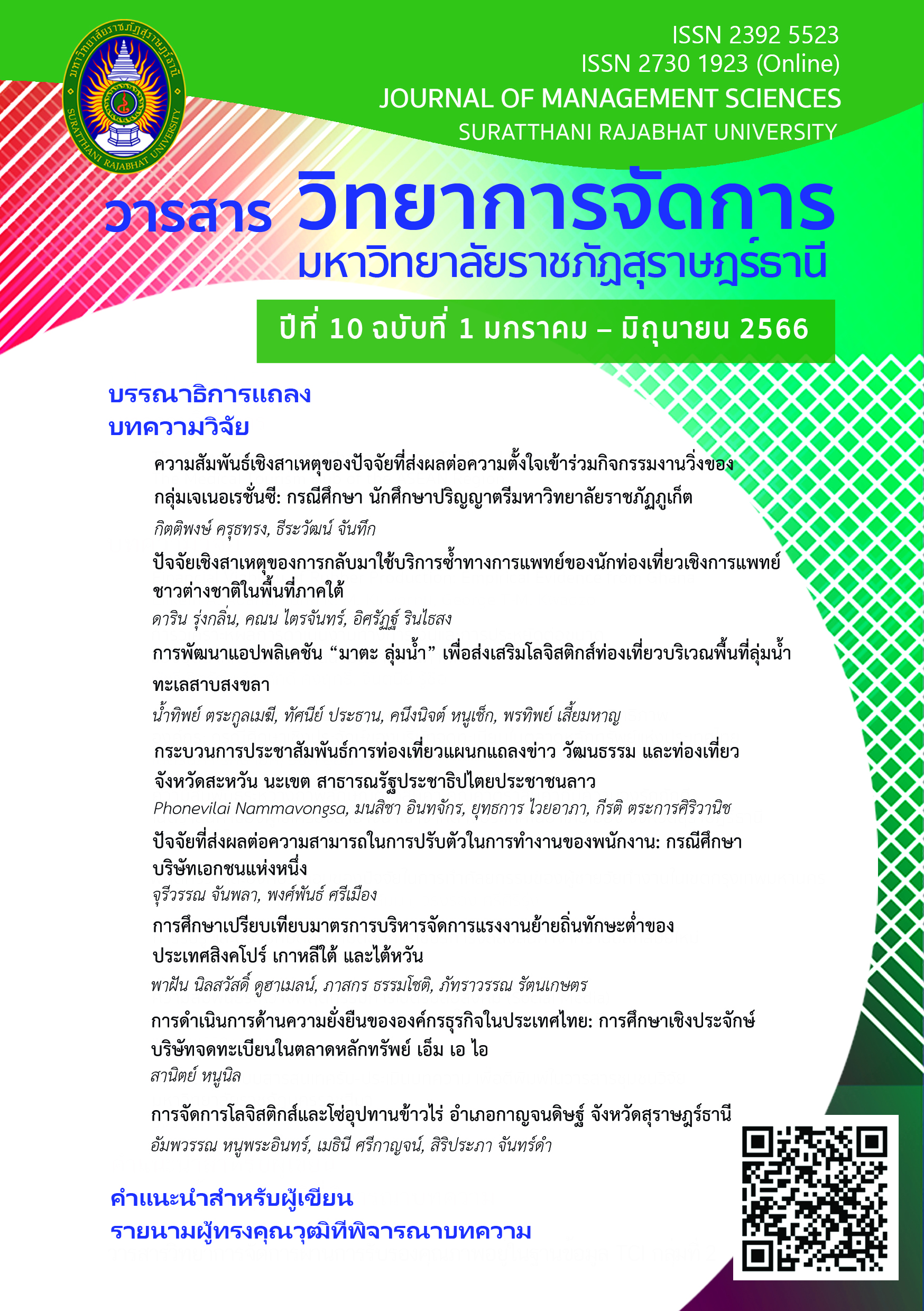Corporate Sustainability Practice in Thailand: An Empirical Study of Listed Companies on the Market for Alternative Investment
Main Article Content
Abstract
Currently, sustainability is a top organizational priority, especially for businesses participating in driving sustainability. This research aimed to: 1) study the level of corporate sustainability practices in Thailand and; 2) analyze factors influencing corporate sustainability practices. Quantitative research was done with data collected by questionnaire. Samples were managers or staff of listed companies on the Market for Alternative Investment (mai), a total of 118 organizations. Descriptive statistics, including frequency, percentage, means, and standard deviation, were used to test hypotheses, with correlation and multiple regression analysis (enter method). The results were that overall, organizations demonstrated high levels of corporate sustainability practice in all aspects. The three highest levels of corporate sustainability implementation were: 1) environmental management in organizational operations; 2) operations following good governance/corporate governance; and 3) participating in community/society problem-solving or development. The environmental sustainability dimension will be most focused on Thai businesses in a future. Business organizations and other sectors may apply these research results to policy formulation and organizational sustainability operations.
Article Details

This work is licensed under a Creative Commons Attribution-NonCommercial-NoDerivatives 4.0 International License.
References
Aaker, D. A., Kumar, V., & Day, G. S. (2001). Marketing Research. (7th ed.). New York: John Wiley & Son Inc.
Ahmed, M., Mubarik, S., M., & Shahbaz, M. (2021). Factors affecting the outcome of corporate sustainability policy: a review paper. Environmental Science and Pollution Research, 28,10335-10356.
Aldrich, H., & Auster, E. R. (1986). Even dwarfs started small: Liabilities of age and size and their strategic implications. Research in Organizational Behavior, 8, 165–198.
Amari, M., Mouakhar, K., & Jarboui, A. (2021). ICT development, governance quality and the environmental performance: avoidable thresholds from the lower and lower-middle-income countries. Management of Environmental Quality, 32(2), 125-140.
Annunziata, E., Pucci, T., Frey, M., & Zanni L. (2018). The role of organizational capabilities in attaining corporate sustainability practices and economic performance: Evidence from Italian wine industry. Journal of Cleaner Production. 171, 1300-1311.
Avery, C., G. (2015). Key corporate sustainability drivers: engaged boards and partnerships. STRATEGY & LEADERSHIP. 43(3), 44-48.
Centre for SDG Research and Support. (2020). 5-year review Driving SDGs in Thailand: 5 things that are doing well. https://www.sdgmove.com/2020/09/26/
Chege, M., S., & Wang, D. (2020). The influence of technology innovation on SME performance through environmental sustainability practices in Kenya. Technology in Society. 60, 1-12.
Chowdhury, S., Dey, K. P., Rodríguez-Espíndola, O., Parkes, G., Tuyet, A. T. N., Long, D. D., & Ha, P. T. (2022). Impact of Organisational Factors on the Circular Economy Practices and Sustainable Performance of Small and Medium-sized Enterprises in Vietnam. Journal of Business Research, 147, 362-378
Das, M., Rangarajan, K., & Dutta, G. (2020). Corporate sustainability in small and medium-sized enterprises: a literature analysis and road ahead. Journal of Indian Business Research. 12(2), 271-300.
Feng, T., Li, Z. Shi, H., & Jiang, W. (2022). Translating leader sustainability orientation into green supply chain integration: a missing link of green entrepreneurial orientation. Journal of Business & Industrial Marketing, 37(12), 2515-2532.
Global Reporting Initiative. (2021). GRI Standards by language. https://www.globalreporting.org/standards/download-the-standards/
Hair, F. J., Black, C. W., Babin, J. B., & Anderson, E. R. (2010). Multivariate Data Analysis. (7th ed.). Upper Saddle River, NJ: Pearson Prentice Hall.
Hamidu, A., A., Haron, H., & Amran, A. (2015). Corporate Social Responsibility: A Review on Definitions, Core Characteristics and Theoretical Perspectives. Mediterranean Journal of Social Sciences, 6(4), 83-95.
Krejcie, R. V., & Morgan, D. W. (1970). Determining sample size for research activities. Educational and Psychological Measurement, 30(3), 607-610.
Kumar, V., Ekren, Y., B., Wang, J., Shah, B., & Frederico, F. G. (2022). Investigating the impact of COVID-19 on sustainable food supply chains. https://www.emerald.com/insight/content/doi/10.1108/JM2-03-2022-0072/full/html
Menon, R. R., & Ravi, V. (2021). Analysis of barriers of sustainable supply chain management in electronics industry: An interpretive structural modelling approach. Cleaner and Responsible Consumption, 3,1-14.
Mukherjee, S., Nagariya, R., Baral, M. M., Pate, S. B., Chittipaka, V., Rao, S. K., & Rao, A. V. U. (2022). Blockchain-based circular economy for achieving environmental sustainability in the Indian electronic MSMEs. https://www.emerald.com/insight/content/doi/10.1108/MEQ-03-2022-0045/full/html
Noonin, S. (2021). Corporate social responsibility of hotel business. Silpakorn University Journal, 41(1), 53-64.
Oyewo, B., Tawiah, V., & Hussain, T. H. (2022). Drivers of environmental and social sustainability accounting practices in Nigeria: a corporate governance perspective. https://www.emerald.com/insight/content/doi/10.1108/CG-09-2021-0336/full/pdf PricewaterhouseCoopers (2015). Make it your business: Engaging with the Sustainable Development Goals. https://www.pwc.com/gx/en/sustainability/SDG/SDG%20Research_FINAL.pdf
Rockström, J., & Sukhdev, P. (2016). The SDGs wedding cake. https://www.stockholmresilience.org/research/research-news/2016-06-14-the-sdgs-wedding-cake.html
Rovinelli, R., & Hambleton, R. K. (1977). On the use of content specialists in the assessment of criterion-referenced test item validity. Tijdschrift voor Onderwijsresearch, 2(2), 49-60.
Samakeetham, S. (2021). Good governance and corporate social responsibility. (2 nd ed.) Bangkok: National Institute of Development Administration.
Schönherr, N., Findler, F., & Martinuzzi, A. (2017). Exploring the Interface of CSR and the Sustainable Development Goals. Transnational Corporations, 24(3), 33-47.
United Nations. (2022). Do you know all 17 SDGs?. Retrieved September 15, 2022 from https://sdgs.un.org/goals
Sendawula, K., Bagire, V., Mbidde, L. C., & Turyakira, P. (2020). Environmental commitment and environmental sustainability practices of manufacturing small and medium enterprises in Uganda. Journal of Enterprising Communities: People and Places in the Global Economy, 5(4), 588-607.
Thaipat Institute. (2022). 4 Government CSR roles. https://www.thaicsr.com/2010/09/4-csr.html
The Stock Exchange of Thailand. (2021). ESG Impact Assessment Report: THSI 2021. https://www.setsustainability.com/libraries/1109/item/esg-impact-assessment-report-thsi-2021?category=5&type=&search=
The Stock Exchange of Thailand. (2022). The structure of industry grouping in the Market for Alternative Investment (mai). https://classic.set.or.th/mai/th/company/industry_group_p1.html
United Nations Sustainability Index Institute. (2019). SCR500: SDG Commitment Report Empowering Investors on Both Profit and Impact. 2019. https://bd74a1b5-d4ae-492e-bb52-86699b18885e.filesusr.com/ugd/a988f5_97b50909a95b48edb0b333be63284694.pdf
United Nations Sustainability Index Institute. (2021). 5 Years SCR 500 SDG Commitment Report 2021: Preliminary Results. 2021.


